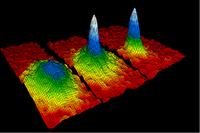 I spent an evening with a Nobel Prize winner last night; me and about three hundred others, at Auckland University's Robb lecture given by physicist Carl Weiman.
I spent an evening with a Nobel Prize winner last night; me and about three hundred others, at Auckland University's Robb lecture given by physicist Carl Weiman.Carl Weiman won his prize for producing a Bose-Einsten condensate, meaning that he and his team had managed to cool a collection of atoms down to just billionths of a degree greater than Absolute Zero, the temperature at which there is neither molecular nor atomic motion. Nothing in nature occurs at this temperature -- the background temperature of deep space is some three degrees higher -- so as Weiman pointed out, he can say with complete confidence that his lab in Colorado is the coldest place in the universe.
Production of a small piece of matter this cold does two things: First, it confirms a prediction made nearly eighty years ago by Satyendra Nath Bose and Albert Einstein; and second, it produces a bunch of atoms with some size that are in a single quantum state -- that picture above shows the representation of one of these 'superatoms' being formed; it is in the order of 0.1 mm across! Given that this 'superatom' can be produced on a table-top, instead of needing a cyclotron the size of a cricket oval or more, this is an enormous breakthrough, one offering tremendous opportunities for discovering more abut the quantum universe, and numerous potential technological spinoffs.
Weiman is also intensely interested in the methods of science education -- in his lectures he uses numerous ingenious java applets and other methods to demonstrate difficult scientific concepts in an easy-to-understand manner. Weiman's applets to support this lecture can be found here; his website chockfull of Interactive Physics Simulations is intended to help explain the fundamental concepts of physics, and it's also loads of fun.
The good news is that if this interests you and you missed last night's lecture, there are still two more to come. Details here.
3 comments:
hi pc,
a quick nitpick:
Absolute Zero, the temperature at which there is neither molecular nor atomic motion.
classically, this is how absolute zero was "found". but this has been known to be wrong for a long time now - one manifestation of the uncertainty principle is that the better you know a particles momentum (atomic motion) the less you can know its position:
dx dp = constant
(dp -> 0, means that dx -> very large number)
so that if your experiment did indeed stop particles completely it would no longer be the size of a table-top, or a cricket oval, but infinite (!!).
the correct term to use is that the atoms are all in their "ground" state, which is their lowest possible energy state.
this is what makes BEC's interesting. quantum mechanically there are 2 types of particles: bosons and fermions.
fermions (like electrons, or anything with with half-integer "spin") have the property that 2 particles can't be in the same state. however bosons, (like photons, or anything with integral "spin" - in special circumstances 2 fermions can join together in to make a boson too) can all have the same state. in a bose-einstein condensate the state they all have is the ground state.
sorry if you don't care about the detals; undoubtedly you heard most of this last night, but when informing others it's important to get the terms right!
cheers
I was there as well, it looks like it's going to be great lecture series. I'm supprised you didn't ask a question about the uncertainty principle Peter...not like you to hold back. :-)
"I was there as well, it looks like it's going to be great lecture series."
The place was packed, wasn't it Mepoc. Good to see.
"I'm surprised you didn't ask a question about the uncertainty principle Peter...not like you to hold back. :-)"
Nothing wrong with the observations involved in forming that principle, Mepoc, just in its many misinterpretations. ;^0 Not really the time and place for ~that~ discussion, do you think. A group of us are keen to pursue that topic again soon though if you're interested -- discussing the philosophical implications of modern physics?
"Carl Weiman's lab isn't always the coldest place in the universe. There's a lab at Otago that regularly gets just as chilly."
Yes, he pointed out there are now 200 or so working BEC experiments, although he did think NZ's only one was in Auckland. I hope you did go down and ask for ice cubes -- a BEC condensate would surely make a perfect martini., :-)
Anon: "The correct term to use is that the atoms are all in their "ground" state, which is their lowest possible energy state." In my defence, I did give a link to explain the concept more thoroughly, but I was trying to make the difficult more intelligible. Talk of "ground states" or asymptotic conditions might have sent them straight to the fridge. Fascinating, isn't it, how those pictures above come as close as we've come to seeing the 'graininess' of the universe in concrete terms.
"This is what makes BEC's interesting. quantum mechanically there are 2 types of particles: bosons and fermions."
Thanks anon. Details are good. I've been sent a link that explains the differences quite nicely: http://particleadventure.org/particleadventure/frameless/chart.html Carl Wieman was asked to explain the difference last night, and he said perhaps the quickest way he could explain it was to say that you can make a BEC with bosons, but not with fermions. :-)
Post a Comment